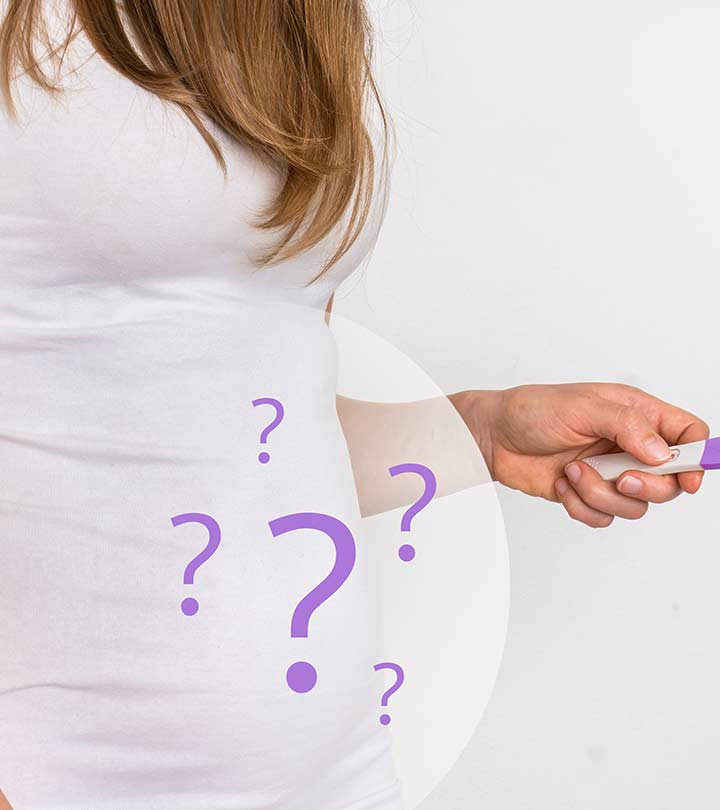

Experiencing pregnancy symptoms but negative test results may be disheartening for women trying to conceive. The tests for pregnancy involve checking your blood or urine for the human chorionic gonadotropin (hCG) hormone. Home pregnancy tests detect the presence of the hCG hormone in urine. hCG is produced in the body after the implantation of a fertilized egg in the uterus, and its levels increase in blood and urine during the first trimester. However, these tests are not 100% accurate and may produce false-negative or false-positive results (1) (2)
.
Continue reading this post to learn what may cause a negative pregnancy test despite having symptoms of pregnancy.
True Pregnancy With Pregnancy Symptoms But Negative Test
Urine pregnancy tests may produce false-negative results, that is, the test may show you are not pregnant while you are actually carrying a baby. This may happen due to:
1. Taking the test too early in pregnancy
The amount of hCG increases as the pregnancy progresses and may take some time to reach a level that a test is capable of detecting (3). So, the test kit may fail to detect low levels of the hormone if tested too early and show a negative result. In such as case, you can test again after a week.
Some test kits may instruct you to take the test on the day you expect your period to start. However, the FDA suggests taking a home pregnancy test one to two weeks after you miss your period to obtain the most reliable results (4).
2. Having hormones in amounts lower than the detectable levels
Certain factors may be responsible for a low level of hCG hormone at the time of test (5) (6).
- The hCG levels may naturally vary among women with normal pregnancies, with peak and low hCG levels at different times.
- There may be an imprecise estimation of the expected day of the next menstrual period, causing low levels of hCG at the time of the test.
- Testing later in the day where the hormone concentration may be affected by water intake.
3. Diluted sample
It is advised to use the first morning urine for the test as it is supposed to have the highest concentration of hCG (4). Drinking a lot of water before the test or even the night before may dilute the urine and reduce its hCG content below the detectable limit of the test.
4. Delay in taking the test
The following situations may arise if there is a delay in taking the test (7) (8)
.
- The mechanism of a usual positive test progresses by the sandwiching of free antibodies, fixed antibodies, and the hCG molecules. If the hCG levels are too high, they separately saturate the two types of antibodies, preventing the sandwich formation known as the hook effect. This phenomenon may give a false-negative result.
- Different variants of hCG may be present later in pregnancy, and some tests may fail to detect these, showing a negative result.
5. Erroneous methods or a faulty test kit
Though the majority of the home pregnancy test kits follow similar methods, it is always advisable to read the instructions carefully before performing the test. Not following the instructions may cause errors in the results. A particular test kit may be faulty due to manufacturing defects or improper handling and storage. Additionally, ensure that the kit is new as the results may not be reliable past the expiry date.
Conditions Causing Pregnancy Symptoms But Negative Pregnancy Test
All fertilized eggs may not result in a healthy pregnancy and may be associated with abnormal medical conditions such as:
- Ectopic pregnancy: It is the condition where the embryo develops outside the uterus, mostly in the fallopian tube. Initially, you may experience pregnancy symptoms similar to a normal pregnancy with signs such as tender breasts, missed menstrual period, or an upset stomach (9). However, since it is not a normal pregnancy, the hCG levels will be too low and will lead to a negative test result.
- Molar pregnancy: It is a rare condition where abnormal fertilization causes an abnormal fetus to form. The placental tissue grows as a cellular mass inside the uterus. These benign tumor cells may release high amounts of hCG, producing a hook effect or degradation products of hCG not detectable by test kits. In both the cases, a negative test result is obtained (10). A molar pregnancy may initially produce regular signs of pregnancy, such as morning sickness and sore breasts, but the pregnancy ends in a miscarriage (11)
.
Factors That May Make You Feel Pregnant When You Are Not
Hormonal fluctuations in the body may cause pregnancy-like symptoms.
1. Premenstrual syndrome
It is a group of symptoms that occur due to hormonal fluctuations before a menstrual period. The symptoms include breast swelling or tenderness, fatigue, mood fluctuations, and stomach discomfort that may resemble those during pregnancy (12). The hormone progesterone is considered responsible for it (13) (14).
2. Ovulation
Similar symptoms but in milder forms may appear during the release of eggs from the ovaries (15). If the duration of your menstrual cycle varies, ovulation signs may be mistaken for signs of pregnancy.
3. Medications
Medications used in fertility treatments consist of hormones, such as progesterone and gonadotropins, which are similar to the ones secreted by the body to initiate and maintain pregnancy. These agents may have side effects that resemble pregnancy symptoms if you are undergoing such treatments to assist fertility (16) (17).
4. Pseudocyesis
It is a rare psychosomatic disorder where a woman falsely believes that she is pregnant and even manifests the signs and symptoms of pregnancy from irregular or no periods, distended abdomen, nausea and vomiting, breast shape and size changes to even sensing fetal movements and milk secretion. Several neuronal, hormonal, and pathological conditions (tumors, cysts, or fibroids in the reproductive organs) have been found responsible (18).
Dealing With Stress When Trying To Conceive
The waiting cycle of tracking your fertile days, trying to conceive, and testing for pregnancy can become stressful. However, you must remember that stress may reduce your chances of conceiving, and it is crucial to take care of your mental well-being in addition to your physical health (19). Take care of your mental health by (20):
- Following a good lifestyle with nutritious food and moderate exercise
- Expressing your feelings to your partner, a trusted friend, or a family member
- Making time to pursue your hobbies
- Relaxing with meditation or mindfulness techniques
- Seeking medical help if you feel overwhelmed or have doubts
Several symptoms similar to but unrelated to pregnancy may excite you when you are planning a pregnancy. For example, nausea and vomiting may be associated with indigestion or an intestinal infection and stomach cramps with frequent urination, a result of a urinary tract infection. Track your menstrual cycle accurately and undergo the pregnancy test at the recommended time. Two successive negative reports, one week apart, are seldom wrong. Make sure you strictly follow the instructions mentioned in the package insert. However, do not delay seeing a doctor if you continue experiencing pregnancy symptoms but negative test results.
Key Pointers
- A false-negative pregnancy test may be due to testing too early, a dilute urine sample, or using improper methods.
- Medical conditions after fertilization such as ectopic pregnancy or molar pregnancy may cause pregnancy symptoms but a negative test result.
- Symptoms of ovulation, premenstrual syndrome, or pseudocyesis may resemble those of pregnancy in non-pregnant women.
References:

Leave a Reply